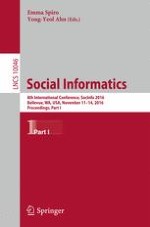2016 | OriginalPaper | Chapter
Using Social Media to Measure Student Wellbeing: A Large-Scale Study of Emotional Response in Academic Discourse
Authors : Svitlana Volkova, Kyungsik Han, Courtney Corley
Published in: Social Informatics
Publisher: Springer International Publishing
Activate our intelligent search to find suitable subject content or patents.
Select sections of text to find matching patents with Artificial Intelligence. powered by
Select sections of text to find additional relevant content using AI-assisted search. powered by
